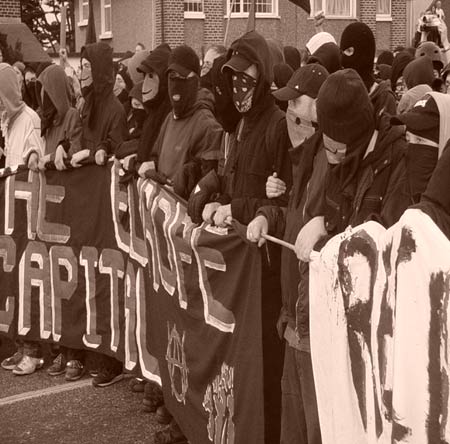Dublin Mayday: Why we pushed through police lines
05.05.2004 13:31 | May Day 2004 | Analysis

Anarchist Confrontational Bloc!
We have no leaders and we reject authority. We believe it is neither possible nor desirable to tell others how to behave on a demonstration. We also reject the media division of demonstrators into “violent” and “non-violent”. In a world where hundreds of thousands of people die every year due to the economic policies of global capitalism, the discussion of the “violence” of a push through police lines or property damage on a demonstration becomes an irrelevance.
Violence comes from the state. Violence comes from a system where profit takes priority over humanity. Our attempts to rise above the attempted division of “good” and “bad” protesters reflects the attitude of many of the discussions and manifestations of the global anti-capitalist movement over the last few years.
The consensus decision of the meeting was to form a bloc without guidelines that would march together with our fellow protesters from the Dublin Grassroots network to Farmleigh House where the 25 leaders of Fortress Europe were meeting.
Demonstrations where people are herded from one place to another, miles from where decisions are being taken, can be ignored. We took our protest to Farmleigh House to directly disrupt the gathering of the EU. We did not ask permission to do this and we don’t need to.
We feel that it is appropriate on a weekend of demonstrations against borders, to confront the lines of police creating a border between ourselves and those who create the policies which result in the deaths of thousands of desperate people on the borders of Europe, and the internment of many more in detention centres.
The militarisation of Dublin to prepare for the summit is not shocking. These 25 politicians have to meet behind these lines because of the violence and poverty their policies create. It is right that they should experience the same fear and look out onto the same razor wire fences and military controls that face the thousands of migrants and refugees forced to leave their homes.
Our intention was to reach Farmleigh and make our protest with dignity. We knew we would have to face militarised police to do this. We decided that we would not cause property damage and we would not be an aggressive bloc or attack the police. However, we decided not to turn and walk away as soon as police blocked our path and not to allow ourselves or others to be attacked by the police without offering resistance and self-defence of ourselves and those around us.
We knew that not everyone who participated in the demonstration would be aware of our meeting or in agreement with our decisions and we did not seek to control the behaviour of others.
When the police formed a line to stop the demonstration at the Ashton Gate roundabout the Dublin Grassroots Network stopped their march 200 yards from the lines.
Some of us who wished to confront the decision to prevent our protest from going ahead then calmly formed organised lines behind a banner, locked arms and marched and pushed through the first line of police. We did this to show that we will not be intimidated by a show of force and we will not allow state violence to silence us. Many of the people who stood and faced the police were ordinary women and men from Dublin.
We would like to thank the solidarity of people, who despite their decision to stop and not confront the police, nonetheless waited for those who did, so that we would not become isolated, and so we could march back to town, as one.
At anti-summit demonstrations around the world, States have shown the extent of military force and violence they are prepared to use against people who question and confront their “democratic” regimes. On Saturday the actions of the riot police using water cannons from the North of Ireland and baton charges to attack a demonstration, making indiscriminate arrests and refusing people bail for minor offences like breach of the peace and trespass shows that the Irish state is no different.
Resist state violence
Our passion for freedom is stronger than their prisons!
Comments
Display the following 20 comments